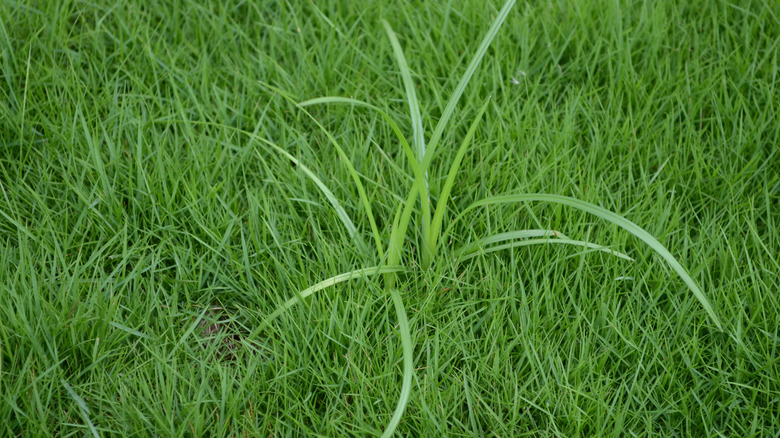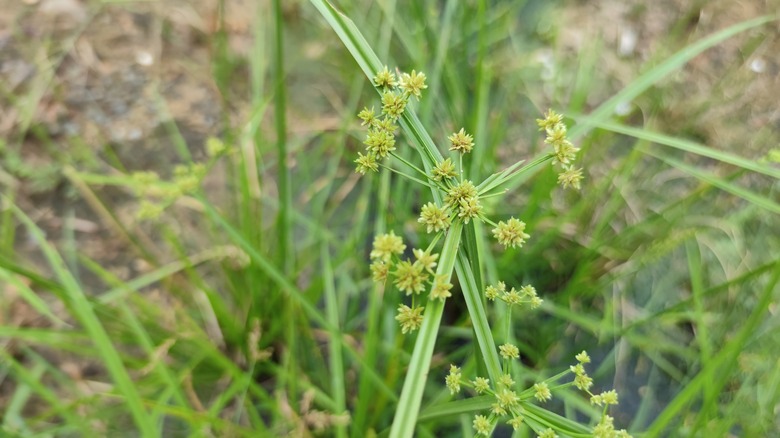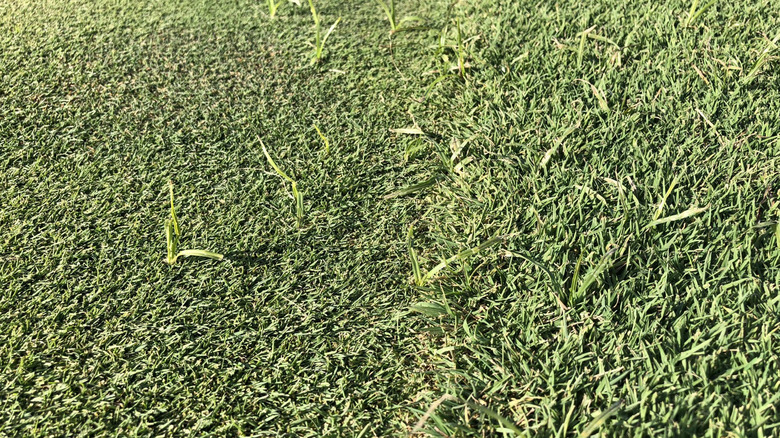Do You Have A Pesky Nutsedge Infestation In Your Yard? Here's What To Do
Having a perfect green lawn takes a lot of hard work, especially when it comes to pulling and treating weeds. While some lawn weeds — like dandelions — are pretty easy to get rid of, things get a lot more complicated when it comes to more stubborn weeds like nutsedge. Nutsedge is one of those weeds that if you haven't heard of it before, you're lucky. Once you have a nutsedge infestation, it is an uphill battle and becomes like a "curse to live with," as described by one frustrated nutsedge sufferer on Reddit. So, to find out more about this fast-spreading weed and get advice for how to combat it, we spoke to Rob Palmer, the President of Lawn Squad.
"Nutsedge can grow and reproduce through multiple methods including seed, underground stems known as 'rhizomes,' and small tubers called 'nutlets' that grow in the ground on or near the plant's root system," explains Palmer. He adds, "Because of this aggressive growth habit, it is recommended to spray out nutsedge and not recommended to pull nutsedge weeds by hand. Pulling nutsedge by hand can activate dormant tubers [and] nutlets below the surface, resulting in more nutsedge plants."
So, this weed is basically the plant version of a three-headed Hydra from Greek mythology and is definitely something you want to kill as soon as possible. However, before we get into treating nutsedge, how do you even know if you have a nutsedge problem?
How to know if that weed in your yard is nutsedge
One issue with figuring out if you have a nutsedge problem is that the plant can be hard to notice in the beginning because, when it first starts growing, it tends to look a lot like grass. Luckily, if you know what to look for, nutsedge can be spotted early on and better controlled before the problem gets out of hand. As Palmer tells us, "In a lawn setting, nutsedge tends to grow at a much quicker rate than the surrounding grass." This means that if you are due to mow and notice that there are a few grass-like plants that are growing higher than your turfgrass, it is worth double-checking to make sure these plants are not nutsedge.
"Nutsedge is easily identifiable given its lime green color, triangular stems, and quick growth rate," Palmer points out. In fact, if you pick a blade of nutsedge and roll it between your thumb and forefinger, you should be able to feel the triangular shape of the weed. Another good clue is that nutsedge typically grows in clusters with each plant starting from one stem and branching out into many blades unlike turfgrass, which grows in clumps with each blade extending up directly from the soil.
What do you about your nutsedge
The problem with trying to get rid of nutsedge (besides the fact that you can't pull it) is that most general herbicides don't work against it. So, if going the chemical route, you need to get specific. "Herbicide products that contain Sulfentrazone or Halosulfuron-methyl are designed to control sedges when applied correctly," Palmer advises. "If spray-treating nutsedge, always try to spray the plants on a 45-degree angle to maximize leaf contact with the herbicide," he adds.
Unfortunately, after you treat your nutsedge with pesticide, the job may not yet be done. Because nutsedge is such a tough little plant, it is important that you also take steps to increase the strength of your lawn and decrease the likelihood of your nutsedge coming back. Nutsedge tends to like humid and wet environments and grows especially well in moist soil. Because of this, it is important to think twice before you water your lawn every day and instead water your grass sparingly and deeply to grow deeper roots. You should also choose the best time to water your lawn and avoid watering in the evening as this will cause your grass to stay wetter for longer.
"Maintaining a thick and healthy lawn through means of fertilization, pest management, aeration, and overseeding can help your lawn outcompete this aggressive weed," concludes Palmer. "It is always a good idea to consult with your local lawncare experts to help tailor a thorough weed control strategy for weeds like nutsedge and keep your property looking its best all year long."


